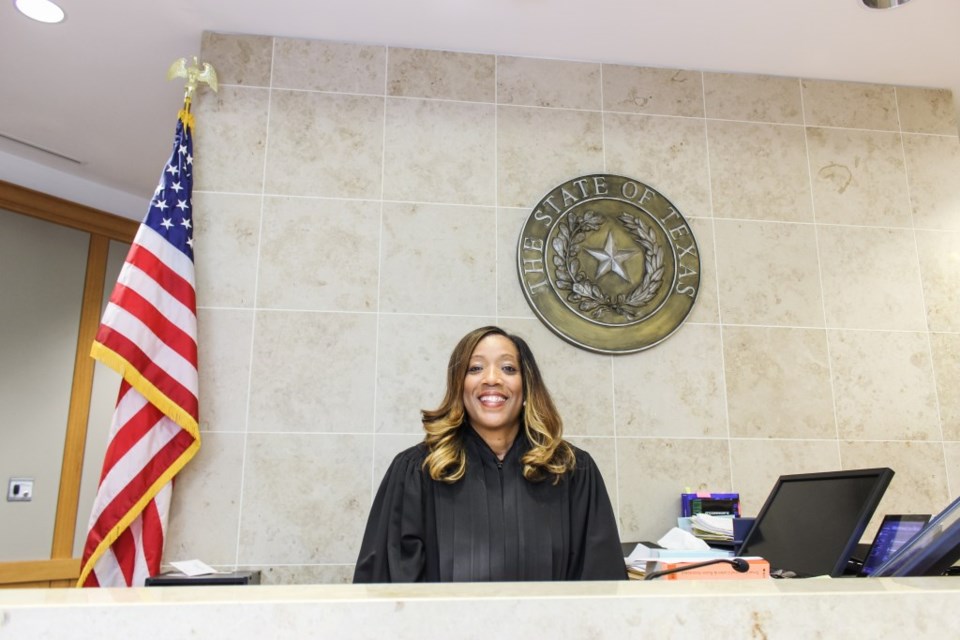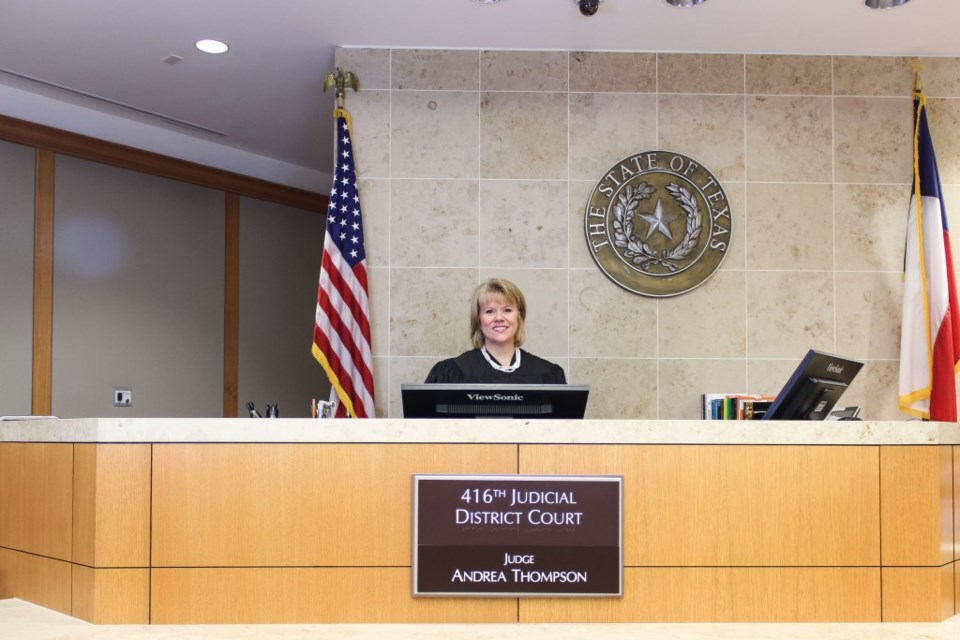The seat of justice in Collin County rests just off of the highway, bald dome and decorative columns visible from the road. Inside, the courts are spread across three floors, where the most important decisions are being made every day. The Collin County Courthouse is where more than half of our tax dollars go, and is the meeting place of law and enforcement, on a plot of mostly empty land, picked so that the system can grow with the population of the county.
The justice system is traditionally very male-dominated. However, according to industry data, in 2017, women accounted for 50.3 percent of all law school graduates in the country. Berkeley Law’s 2020 class is 65 percent female; Yale Law School’s class of 2020 will be 53 percent; Georgetown Law’s 2016 entering class is also 53 percent women, among others.
Today in Collin County, of the 11 district judges, seven are female; more women are serving in the justice system than ever before.
The 199th

Judge Tucker turns to the jury first. “Now it’s either Tahiti or Alaska in here, so if it’s too hot or cold, I apologize,” she says. “Let me know and we’ll try to do something about that.” Her demeanor is relaxed enough that, when she was new to the bench, 2012, people coming to her court would stop short at the sight of her. She’s the only one of her kind; in Collin County’s 170-year history, she was the first judge of color.
Early in her tenure, Judge Tucker remembers attending a conference and calling one of the other female judges of Collin County to say, “I’m in here with a sea of white hair. It’s a room of 600 judges. Where are the women?”
Judge Tucker grew up in Sherman, Texas, where she decided at age eight that she wanted to be an attorney. While she often credits her family, particularly her grandparents with instilling in her a strong sense of faith and fortitude, she had little practical guidance. Judge Tucker remembers going to the public library to learn about Thurgood Marshall and research how to become a lawyer. No one in her family had ever gone to law school; her mother had gone to community college but Judge Tucker would be the first to go to a four-year university.
She never wanted to become a judge, though she’s satisfied with where she has ended up.
She ran at the encouragement from other female judges, like Judge Cynthia Wheelis, when Judge Robert Dry announced his retirement, starting in 2012. The title of judge comes with awesome responsibility and tremendous power. Good people need to step up, she decided.
“Don’t pat yourself on the back too hard.” The son of two Judges, Ray and Cynthia Wheelis—nicknamed Heelis and Sheelis around the courthouse—said to his parents on the day of her investiture. “It’s 2012 and you’re just now getting a person of color on the bench? That’s ridiculous.”
Angela’s court is general jurisdiction; every day brings a slew of vastly different cases to her bench, from Child Protective Services (CPS) to defendants facing felony charges, to divorce, and CPS’s drug court. By the time Judge Dry retired, he was ill; ill enough that the day after her investiture, Judge Tucker took over his court, a full six months before she was originally meant to step up.
Her team worked through lunch with her, eating Braum’s in their offices while they chip away at it. She expects a lot; in her first few weeks, she tried five murders back to back, because the accused in those cases had been sitting in jail for two or three years. It was like running a marathon right out of the gate.
“For there to be more after me,” she says. “I have to set a high standard.”
When she first sat on the bench, people still called her office, asking her to represent them as an attorney. After working first as a prosecutor in Collin County, then a defense attorney, she understands the challenges of both roles in the court. She’s represented clients facing the death penalty, where “you know your client is dead in the water, but you still have to be there, advocate for them zealously, which is what the law requires.” Once, a client had given a three and a half-hour taped confession, even pointing out evidence the police had missed. No matter how he pled, she knew that the jury wouldn’t be out long. But she still showed up and did her job.
It's especially frustrating to her when she sees attorneys that don't do the same. Across the country, indigent defense, state-appointed defense for those who can't afford it, has been recognized as a system in crisis, largely because of funding. Collin County doesn't have a public defender office; instead, private attorneys are assigned cases from the court. Judge Tucker took on her share of indigent cases. It's personal to her that all cases are worked the same, no matter the paycheck the attorney receives.
A recent Texas Monthly article found that Texas is one of the states that spend the least on indigent defense, leaving the counties to cover most of the costs, costs that, in a county growing as quickly as Collin County, must be growing too. It's an especially important issue to Judge Tucker because the power to appoint indigent defense attorneys is in the hands of judges like her.
Read more: Jeri Chambers named Collin County Woman of the Year
“Just do your job the right way,” she says. “That’s why the system has this dynamic, that poor people feel like the system is rigged against them. That’s not fair.”
Whenever she makes a ruling, she feels the weight of a person’s entire future on her shoulders. So she explains every ruling so that no one has to guess. They may not leave her court with the ruling that they wanted. But at least, she hopes, they know that she took their case seriously. When a person comes in, no matter their situation, it’s her responsibility to make sure their treatment is fair.
She recalls one day in court, listening to two prosecutors from Highland Park tell a defendant all the requirements of his parole. He nodded along with them, eyes flickering between them and Judge Tucker watched him.
“Stop,” she said at one point and looked at the defendant. “Repeat back to me what you just heard.”
He went red with embarrassment and mumbled out just enough for her to confirm he had no idea what the prosecutor had been saying. She knew from his file that he’d received a poor education; he hadn’t finished high school. So she took over, explaining his probation without the "legalese," in simpler terms. The prosecutors were a little chastened.
“Well, Judge, you can say things I can’t say,” one reasoned.
“It’s not that I’m saying anything different, I just explained it in a way he understands,” she told them.
It hasn’t been an easy road. Being first never is. A certain amount of pushback from attorneys and staff is expected; Judge Jill Willis assured her once everyone was used to her and her style, it would calm down. But two years later, she checked back in. “Are you still getting challenged?” she asked, incredulous when Judge Tucker admitted yes, from some people, she was.
To Judge Tucker, it’s not wholly surprising and it doesn't sway her. “When you’re blazing a trail, you get challenged.”
The 416th

One floor up, Judge Andrea Thompson for the Texas 416th District Court in Texas considers her docket. It isn’t visible from the courtroom floor, but her desk is lined with post-it notes with messages of love and support from her family, even a spare “Go Cowboys!”
Her docket for the day is a slew of random cases: a messy divorce that's become a two-year crawl, a stolen car, a defendant who’s $800 short of paying her attorney’s bill, a pair of CPS lawyers requesting a delay. There are more than 40 cases on for the day. Courts are like airlines, overbooking every day, simply because one never knows how it will go. Some days, everyone shows up, and there’s a crowd waiting for their turn in front of Judge Thompson. Many go home unheard, rescheduled for another day.
Sometimes, nearly everyone postpones or settles out of court, and she spends her afternoon catching up on the paperwork she’d normally have to save for after hours. She never knows what each day will bring but that’s typical; Collin County is the largest county in the state with general jurisdiction courts. In October, they added two more courts, one civil and one family to handle the increase in cases.
Halfway through the morning, a couple of young attorneys, probably junior partners showing up on behalf of their superiors, stand before her, hoping to set a trial date for a hail damage case. They’ve got four experts they hope to bring and when she hears that, she shakes her head.
“There’s no way you’re subjecting a jury to that for a week,” she says. “We can barely get them to sit through a murder trial for a whole week. If you make them listen to experts on hail damage, by the end of the week, they’ll want to kill you.”
Like Judge Tucker, Thompson learned the practice of law in Collin County. She was even district clerk for four years before she ran for judge, during the critical period where the office went paperless. Those four years gave her a rare insight into the nuts and bolts of the job and it’s well known around the courthouse that she understands the digital system better than anyone. Going digital is the only reason the court has stayed afloat in the middle of the population boom.
In 2015, all of Texas implemented statewide e-filing for all their documents. For example, where once, if someone filed a restraining order on a Friday afternoon, a sheriff’s deputy would have to race over to the courthouse while a clerk stayed late, to pick up a copy, then track down the recipient to serve it. Now, a clerk can file it electronically, which means the sheriff’s deputy gets it wherever they are, cutting out crucial time.
But many days—especially when she’s facing attorney after attorney asking for a delay—the job doesn’t feel like an exercise in efficiency. It’s especially hard for Judge Thompson to see innocent people, kids, for example, caught in a divorce, spending more time in court than they should have to. Her job is to watch out for them so that no one is being taken advantage of by people or the system, keep the process as speedy as possible, and determine who needs a break while upholding the law.
It takes a tough skin to be a judge. “If you’re constantly clutching your pearls, you won’t be able to do it,” she says.
But it’s no easy thing to look at a human, hear their charges and discern who they are. Not long ago, she stared down a kid, just old enough for her court, who’d grown up entangled in a gang. By the time he came face to face with Judge Thompson, he’d run through his chances. His girlfriend sat with their baby in the gallery. Thompson looked for a shred of remorse, and, finding none, gave him his first federal sentence.
Judge Thompson considers herself tough on crime. “No one likes crime. We’re all tough on crime,” she says. But what does it mean to lay down a sentence? What about when the person has children? A spouse? What’s the ripple effect? No one likes having to look at somebody and decide that because of their choices, they’ll be gone for 30 years. “What a waste of life.”
When people walk through her doors, they bring stories of domestic violence, human trafficking, homelessness, murder, heartbreak: things that have a much bigger presence in North Texas than people know. Today, we’re experiencing a 10 percent growth in criminal cases, compounded annually. We're growing quickly, changing from the sleepy bedroom community we were for so long, into a state of urbanization that was always going to happen, being as close to DFW as we were.
Judge Thompson reflects that the job isn’t one full of happy moments. Often, they don’t see us at our most generous and kind, but instead, the worst we have to offer. But sometimes, instead of watching families divide, she gets to preside over adoption, and see a family come together. One family has come through her court three times, to adopt, one at a time, three half-siblings, so that they could stay together.
In her second year, Judge Thompson also initiated a drug court, a problem-solving court that uses a specialized model and takes a team approach to help addicted offenders get treatment, hoping to break their cycle in and out of jail. As Judge Thompson puts it, it’s for people whose problem isn’t crime, but whose crime is a symptom of substance abuse. The program is robust, requiring more frequent check-ins and, overall, a higher level of accountability. Judge Roach runs a similar diversionary program for veterans suffering from PTSD. She and her team work through lunch every Thursday to work the drug court. “It has a direct, positive impact on people’s lives and we get to see it. We don’t get that a lot.”
Read more: Roslyn Dawson Thompson on elevating women in the workforce
In fact, near the end of her day, a pair of defense attorneys pop in with exciting news about one of their clients who is facing charges of substance abuse. They’ve represented him before on similar charges, though he’s never been charged with a violent crime. “We think he’d be a great candidate for drug court,” they tell her. “He wasn’t ready before, but this time, it’s different.”
Their client is a middle-aged man who has never had any counseling or treatment. He's been using since he was a teenager. He recently became a father and he hopes that if he qualifies, he could have the chance to raise infant son. If he qualifies, it’ll be the first time he's ever received help with his addiction. Judge Thompson doesn’t usually know what happens to the people who leave her court, even though her decision has huge effects on their lives. But drug court is different, offering a direct line of assistance that could effectively change someone’s life. It helps her keep faith.
Once upon a time, Farmersville and Wylie were the farthest reaches of the court. Today, however, the judges of Collin County see people from all over the world. Sometimes, they can’t even find a translator for some of the dialects they hear within county borders. It’s a time of change.
The last five judges to join the bench in Collin County were all women. Three were appointed and two, Judges Thompson and Tucker, were elected against male opponents.
If you ask Judge Thompson, she’ll say it’s a testament to the people of Collin County being open-minded, as much as it is to the field of law on the whole.
“The voters voted for the most qualified person,” Judge Tucker explains it simply. “That person just happened to be a woman.”




